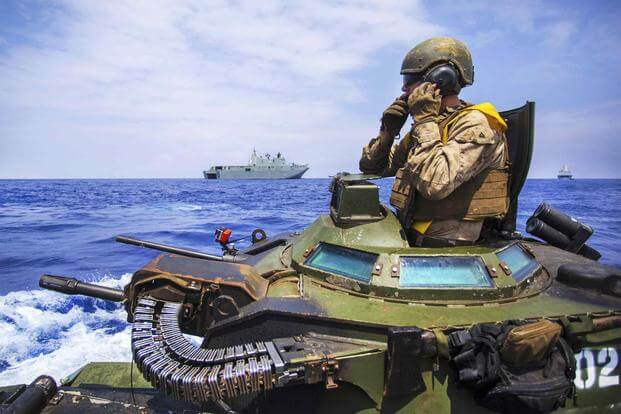A Marine general is firing back at criticism that the Corps is on a path that will leave it unable to respond to emergencies around the world, ending the service's long-standing role as America's crisis-response force.
Lt. Gen. Eric Smith, head of Marine Corps Combat Development Command, is heavily involved in ongoing war games shaping a decade-long plan to reorganize the Marine Corps for future fights. Critics have slammed the plan, called Force Design 2030, as being too narrowly focused on China.
Read Next: Minnesota National Guard Opened Fire on a Vehicle, Commander Says
While some have called it a mistake for Marine leaders to set their sights on operations in one region of the world, Smith said the criticism is unfounded. Marines haven't forgotten their core missions, he said.
They'll still carry out raids, disaster-relief missions and evacuations, he said, but they must be prepared to operate in areas where near-peer adversaries -- such as China or Russia -- also have influence.
"We are still training to do all of the things that we traditionally have done as the 911 force," Smith said. "But ... there's no doubt that the true peer competitors are acting globally, and if you think you can do these lower-end operations without being under some influence -- especially in the information environment -- from a peer competitor, you're simply wrong."
Former Navy Secretary Jim Webb is one of the critics of the Marine Corps' plan. In an op-ed for The National Interest, a conservative foreign affairs magazine, Webb said the Force Design 2030 plan, which calls for close naval integration and island-hopping missions, will leave the Marine Corps less relevant as a stand-alone military service.
"After the centuries it took to establish the Marine Corps as a fully separate military service, it could reduce its present role by making it again subordinate to the funding and operational requirements of the Navy," wrote Webb, a former Marine officer who fought in Vietnam, earning a Navy Cross and Silver Star.
Commandant Gen. David Berger ordered the force design and war gaming after stepping into his position last year. The results include big changes, such as plans to get rid of tank battalions, some infantry units and other personnel.
The savings will be used to pay for new weapons and other equipment. He told reporters in April that the National Defense Strategy points the Navy and Marine Corps toward preparing to counter China as their "pacing threat."
But Webb, in his op-ed, said Berger's plan to "dramatically alter the entire force structure of the Marine Corps" to take on China ignores the unpredictability of war.
"There is no greater danger in military strategy than shaping a nation's force structure to respond to one specific set of contingencies, giving an adversary the ability to adjust and adapt beforehand," he wrote.
The Marine Corps' plan does call for three new rapidly deployable littoral regiments in the Pacific, the first one of which will be based in Hawaii. But Smith said any new capabilities the Marine Corps builds to operate in that region will also be useful in other theaters.
"It has to be useful in the Strait of Hormuz; it has to be useful in the Baltics or the Black Sea," Smith said.
Ultimately, Marines must be prepared to fight a new kind of enemy, which requires change, he added.
"To compete with a peer competitor, somebody who has bombers, fighters, tankers, submarines, space-jamming capability and all the rest, then you really have to step up your game," Smith said.
-- Gina Harkins can be reached at gina.harkins@military.com. Follow her on Twitter @ginaaharkins.
Related: Marine Corps to Shut Down, Cut Back 7 MOSs as the Force Prepares for Change














